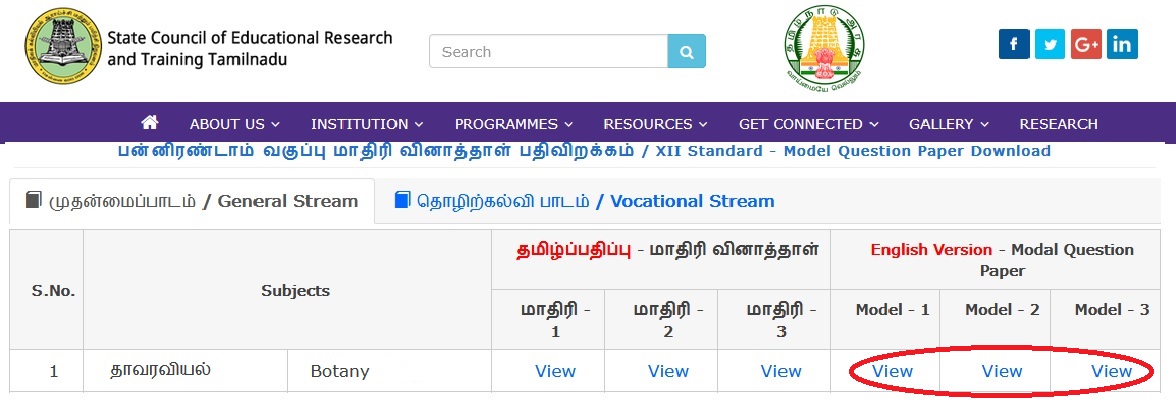TNSCERT XII Standard Botany Model Question Paper 2019 : Educational Research and Training Tamilnadu
Organisation : State Council of Educational Research and Training Tamilnadu
Exam : Higher Secondary Second Year
Document Type : XII Standard – Model Question Paper Download
Category or Subject : Botany
Website : http://www.tnscert.org/webapp2/xiimodelquestionspaper.aspx
TNSCERT XII Standard Botany Model Question Paper
The Government of Tamil Nadu has taken a policy decision on reducing the maximum marks for Higher Secondary Board Examination from 1200 to 600 in order to reduce the examination stress of students besides reducing the number of papers for Language subjects from two to one.
Related : TNSCERT XII Standard Biology Model Question Paper 2019 : www.pdfquestion.in/33999.html
Note :
** These are only model questions. Teachers and students need to focus only on the Pattern of the questions.
Botany
Time : 2.30 Hrs
Marks : 70

Section – I
Answer all the questions:- 15×1=15
1. The number of families in dicotyledonae are…
a) 132
b) 146
c) 165
d) 182
2. Anthers are monothecous in
a) Solanaceae
b) Euphorbiaceae
c) Malvaceae
d) Musaceae
3. In mature sieve elements the pores in the sieve plate are blocked by a substance called…
a) Pectin
b) Renin
c) Callose
d) Elictin
4. The determination of the age of a tree by counting the annual rings is called
a) Palynology
b) Dendrochronology
c) Chronology
d) Pathology
5. The terminal part of a chromosome is called…
a) Sarcomere
b) Telomere
c) Kinetochore
d) Centromere
Download Question Paper :
Model – 1 :
https://www.pdfquestion.in/uploads/pdf2019/34003-Bot1.pdf
Model – 2 :
https://www.pdfquestion.in/uploads/pdf2019/34003-Bot2.pdf
Model – 3 :
https://www.pdfquestion.in/uploads/pdf2019/34003-Bot3.pdf
6. The unit of genetic map is
a) Morgan
b) Centimeter
c) Nanometer
d) Locus
7. Allopolyploid is induced in plant by the following treatment chemical called
a) Quinine
b) Morphine
c) Colchicines
d) Citric acid
8. Insecticidal activity of Bacillus thuringiensis bacteria depends on a toxic protein called…
a) Basta
b) Polyhydroxy butyrate
c) Delta endotoxin
d) Camphor
9. The function of cytokinin is
a) Cell elongation
b) Fruit initiation
c) Cell division
d) differentiation
10. Enzyme pepsin is active in
a) Alkaline medium
b) Neutral medium
c) Acidic medium
d) Basal medium
11. Which of the following is a 5c compound?
a) Glucose
b) Fructose
c) Phospho glyceric
d) RUBP
12. Medicine used for treating heart disease
a) Digoxin
b) Quinine
c) Ephedrine
d) Ginseng
13. Bio fertilizer used successfully in India rice fields
a) Gracilaria
b) Laminaria
c) Azolla
d) Acacia
14. In Ixora coccinea the stamens are
a) Mono adelphous
b) Syngenesious
c) Epipetalious
d) Diadelephous
15. The root hairs originate from
a) Trichonblaste
b) Endodermis
c) Hypodermis
d) Pericycle
Section – II
Answer any six of the following. Question No.22 is compulsory:- 6×2=12
16. What is Epicalyx?
17. What is Pseudo stem?
18. Draw and label amphicribral vascular bundle.
19. What are sclereids?
20. Define crossing over.
21. Define vernalisation.
22. Draw and label lampbrush chromosome.
23. Define humulin.
24. What is the function of DNA ligase?
Section – III
Answer any six of the following. Question No.27 is compulsory:- 6×3=18
25. Name the ornamental plants of Malvaceae
26. What are lenticels?
27. Write any three significance of ploidy
28. What is gene gum method?
29. Write the process by which Co2 is evolved during respiration
30. Write a note on tracheids.
31. Write the economic importance of musaceae.
32. Differentiate C3 and C4 pathways
33. Write the economic importance of groundnut.
Section – IV
Answer all the following:- 5×5=25
34. Explain Clitoria ternatea in technical terms
(Or)
Differentiate heart wood and sapwood.
35. Explain Bentham and Hooker’s natural system of classification.
(Or)
Explain gene mutation.
36. Draw and label T.S of Monocot stem.
(Or)
What is SCP? What are the uses of SCP?
37. Explain Glycolysis (flow chart only).
(Or)
Write the aims of plant breeding
38. Explain C2 cycle (flow chart (or) explanation).
(Or)
Explain special types of Chromosomes.